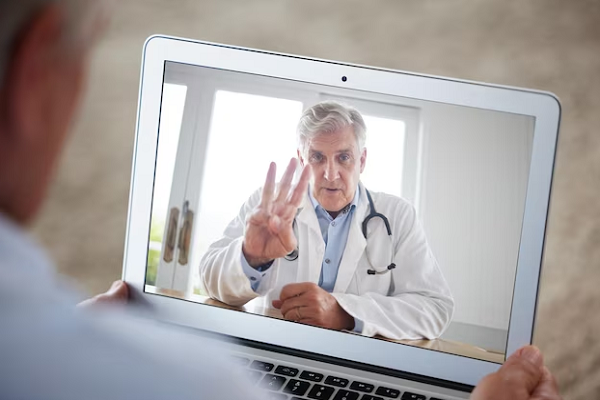
All of the body’s cells contain the chemical known as cholesterol, which resembles fat. Although cholesterol is necessary for hormone synthesis, neuron function, and the formation of cell membranes, too much cholesterol raises the risk of heart disease, stroke, and heart attacks. Here are some healthy lifestyle adjustments that telehealth clinic services can advise you to use to lower your cholesterol level.
9 Helpful Adjustments by Telehealth Clinic Services to Lower Your Cholesterol Level
1. Nutrition and Diet
One of the best strategies to reduce cholesterol is to alter one’s diet. Consuming a diet rich in plant-based foods and fiber can aid in lowering LDL (bad) cholesterol levels. Nuts, fruits, vegetables, whole grains, and legumes are a few foods high in fiber.
In addition, walnuts, flaxseeds, and fatty fish are rich sources of omega-3 fatty acids, which may also help decrease cholesterol. Moreover, foods high in saturated and trans fats, like red meat, fried foods, and processed snacks, should be avoided or limited.
2. Sleep
Sleep deprivation can fluctuate the hormone balance, which affects insulin sensitivity, metabolism, and hunger. Inflammation in the body is exacerbated by poor sleep, and this can lead to elevated cholesterol levels. Telehealth clinic services advise you to get seven and eight hours of good sleep every night.
3. Supplements
Certain supplements may help lower cholesterol levels, but they should never take the place of a balanced diet and lifestyle. Plant sterols and stanols, for instance, can prevent the intestines from absorbing cholesterol. Supplements containing soluble fiber, niacin, and fish oil may also be helpful.
4. Losing Weight
High cholesterol is a result of even a few excess pounds carried around. Use tap water instead of sugary drinks if you consume them. Eat some pretzels or air-popped popcorn as a snack, but watch your calorie intake. If you are craving something sweet, consider low-fat candies like jelly beans.
Telehealth clinic services recommend finding methods to walk more during the day, including parking further away from your office or using the stairs rather than the elevator. During your work breaks, go for walks. Make an effort to perform more standing tasks, including cleaning the yard or cooking.
5. Occasional Drinking
Although moderate alcohol consumption has been associated with increased cholesterol, the advantages aren’t great enough to persuade someone who already doesn’t drink. If you consume alcohol, do so in a small amount. For healthy individuals, that translates to a maximum of one drink per day for men over 65 and women of all ages and a maximum of two drinks per day for men under 65. Remember, drinking too much alcohol can cause major health issues like heart failure, high blood pressure, and strokes.
6. Quit Smoking
Reducing your smoking habit raises your HDL cholesterol. The advantages happen fast. After giving up cigarettes, your heart rate and blood pressure return to normal within 20 minutes. Secondly, your lung function and blood circulation start to improve three months after you stop smoking. Last but not least, your chance of developing heart disease is halved within a year of stopping smoking.
7. Exercise
Cardiovascular telehealth clinic services can be enhanced by exercise. The “good” cholesterol, known as high-density lipoprotein, or HDL, can be increased with moderate physical exercise. Work up to at least 30 minutes of exercise five times a week or 20 minutes of vigorous aerobic activity three times a week, with your doctor’s approval.
Increasing your physical activity can help in weight loss, even if it’s just for brief periods numerous times a day. According to telehealth clinic services, you can also consider strolling quickly every day on your lunch break, cycling to work, engaging in a preferred athletic activity, joining an exercise club, or finding an exercise partner that can help you stay motivated.
8. Stress Management
Stress can cause an increase in cholesterol by boosting the hormone cortisol, which is linked to inflammation and insulin resistance. Stress-reduction methods like yoga, deep breathing, and meditation can be helpful for your physical telehealth clinic services as well as to sustain peace of mind.
9. Stay Hydrated
Staying properly hydrated will help your body keep its cholesterol levels in check, preventing cholesterol growth in your arteries and the possible development of heart-related problems. According to many telehealth clinic services, water can be considered a mild cleaner for your body, aiding in removing substances like high cholesterol that might otherwise persist and cause issues. Thus, by ensuring you consume adequate water, you’re promoting a heart telehealth clinic services lifestyle by assisting your body’s natural processes for controlling cholesterol.
To Wrap Up
Although cholesterol serves several vital purposes in the body, it can lead to heart disease and blocked arteries if it is not properly controlled. It is possible to lower cholesterol and enhance general telehealth clinic services by changing one’s diet and way of living, controlling stress, taking supplements, and getting enough sleep.
However, there are situations when leading a healthier lifestyle is insufficient to reduce cholesterol. If you are feeling symptoms, it is better to consult a professional telepath clinic service like Kwik Care Provider, who are proficient in creating a customized strategy that addresses your particular requirements and health objectives. Make an appointment today!
